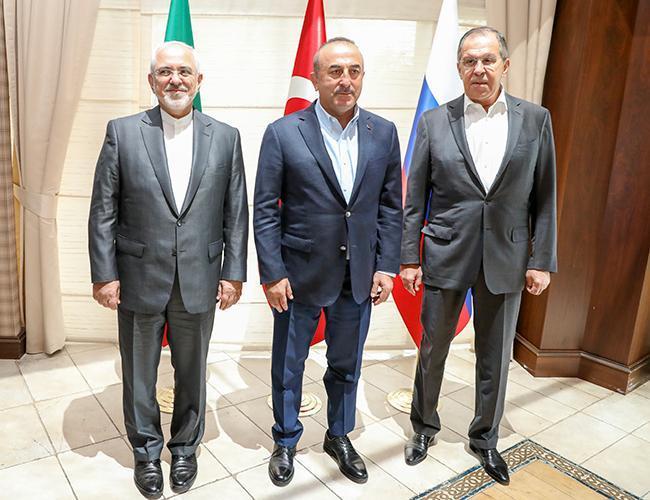
The situation in Syria is much better compared to last year thanks to the Astana Process, Turkish Foreign Minister Mevlüt Çavuşoğlu has said, stressing that a “political solution” is needed for sustainability.
“The Astana Process has yielded positive results in Syria with regard to declaring the ceasefire, establishing de-escalation zones and decreasing tension in the war-torn country. The situation on the ground is far better compared to last year,” Çavuşoğlu told reporters on Nov. 19 after a meeting with Russian Foreign Minister Sergey Lavrov and Iranian Foreign Minister Javad Zarif in Antalya.
“We now have to concentrate on a political process, while continuing to target terrorist organizations like DAESH,” he said, using an Arabic acronym for the Islamic State of Iraq and the Levant (ISIL).
The meeting in Antalya came in the run-up to the Nov. 22 trilateral summit between the Russian, Iranian and Turkish leaders in the Russian Black Sea resort city of Sochi. The meeting in Sochi will be the first such summit between the three countries as they cooperate with increasing intensity on ending the more than the six-year civil war in Syria.
President Recep Tayyip Erdoğan last met his Russian counterpart Vladimir Putin in Sochi on Nov. 13, with the two saying they agree on the need to step up elements for a lasting settlement.
Moscow, Tehran, and Ankara are sponsoring the so-called Astana peace talks, named after the Kazakh capital where they are regularly held, which calls for the creation of “de-escalation” zones in key areas of Syria.
“The parties agreed on all issues,” Sputnik quoted Lavrov as saying after the meeting in Antalya. The Russian minister noted that the army chiefs of Turkey, Russia, and Iran will also meet for discussions on de-escalation zones ahead of the trilateral leaders’ summit.
Meanwhile, Çavuşoğlu stressed that the issue of the Syrian Kurdish People’s Protection Units (YPG) and the Democratic Union Party (PYD) is a “primary sensitivity” of Turkey.
Turkey rejects the participation of the YPG and the PYD in “any meeting” that seeks a solution in Syria, including the Astana and Geneva processes, he said, adding that both Russia and Iran are aware of this.
In recent months, Turkey has markedly toned down its criticism of the Bashar al-Assad regime and focused on opposing the YPG, seen by Ankara as an offshoot of the outlawed Kurdistan Workers’ Party (PKK).
Çavuşoğlu earlier said he was planning to discuss with Lavrov Russia’s vetoing of the U.S.-initiated draft U.N. Security Council resolution on extending the mandate of the UN-OPCW Joint Investigative Mechanism in Syria and the Japan-drafted resolution to extend by one month the mandate of an expert body charged with determining responsibility for chemical weapons attacks in Syria.